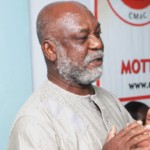General
We don’t get angry enough in Ghana – Prof Karikari calls for moral rebellion
Veteran media freedom advocate and communications scholar, Professor Kwame Karikari, has made a passionate call for Ghanaians to rediscover their moral anger and reject a growing culture of complacency and money worship. Speaking Thursday evening at a public lecture at the GNAT Hall in his honour...
MyJoyOnline
published: Jul 18, 2025


Veteran media freedom advocate and communications scholar, Professor Kwame Karikari, has made a passionate call for Ghanaians to rediscover their moral anger and reject a growing culture of complacency and money worship.
Speaking Thursday evening at a public lecture at the GNAT Hall in his honour to celebrate his 80th birthday and decades of service to journalism and mass communication in Ghana, Africa, and the world, he delivered a stark reflection on the state of the nation’s values.
“I hear people asking Dr Yao Graham why didn’t you become a minister, president a this and that; and he gave a very fitting answer. I think in Ghana, we don’t get angry enough. We should try sometimes to be angry.”
Prof. Karikari said the country had become too tolerant of mediocrity and injustice. He bemoaned what he described as an unhealthy obsession with comfort and softness at the expense of effort and principle.
“We like the soft way too much…we must strive,” he stated.
He said this mindset was closely linked to the country’s distorted relationship with money.
Though not against wealth, Prof. Karikari warned that placing money above all else had derailed many from what truly matters.
“You see, there’s a culture now about money. Money is good. I mean, there’s nothing wrong with money, but if it becomes the God we worship, then we have a problem. And that is what is showing so many young people, so many people away from things that really make life worth living.”
He recalled moments from Ghana’s revolutionary past, contrasting the current hunger for material reward with the spirit of voluntary national service that once prevailed.
“We need the money, but there must be more, better values than money should be able to bring about when a PNDC came to power, and some of us joined, wanting revolution.
“There were people like Dr Yao Graham who worked for two years without a salary. Many people worked like that, and so on and so on.”
Now, he said, even asking for help from communities without financial incentive had become a struggle.
“Today, it’s very difficult to help people, even in the rural areas, to volunteer to do anything. If you don’t pay people even the dirt they have created, they won’t sweep it.”
Prof. Karikari said the national mindset must change—and that change must begin with a personal revaluation of what gives life meaning.
“And I think the mindset we are talking about must start from there. What is the value in life for me, when at the end of the day, I go to sleep, what makes me happy?”
He shared a deeply personal anecdote about being appointed to the Constitution Review Committee and how an elder from his village reacted when he joked about always being called after the politicians had taken everything for themselves.
“When I was appointed to the Constitution Review Committee, an elderly man I respect very much, who comes from my village, called me and congratulated me. And I said, ‘Oh, opanin you know that for some of us, our whole life has been national service. So when the politicians have finished eating the meat and have even sucked out the marrow from the bone, they give us the empty white bone.”
But the elder, he said, challenged his cynicism and pointed him to a deeper reason for why he and others were chosen.
“The man said, ‘Oh Kwame, don’t talk like that. Don’t talk like that. When they were calling you people, did they call so and so,’ and he mentioned about three wealthy names. ‘Did they call those people with those kinds of money to come and work on the Constitution. You don’t manage society with money. You manage society with wisdom, and that’s why they called you’.”
Read More